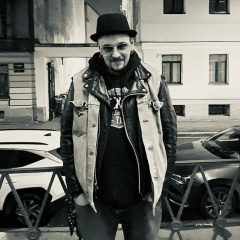— Среди местного населения витают различные настроения. Они уже не ждут, что их примут в состав России. Не верят они и в признание независимости. Гуманитарные конвои в республику приходят, но их содержимое тут же расходится по прилавкам магазинов. Многие местные жители, устав от войны и дабы поскорее ее прекратить, готовы даже на возвращение на Украину. Власть, естественно, боится такого исхода, потому что в лучшем случае им светит украинская тюрьма, а в худшем — сами понимаете.
— Какое отношение у местных жителей к ополчению?
— Когда были активные боевые действия, мирное население готово было закрывать глаза на многие вещи, поддерживать ополчение, власть. Сейчас же, когда довольно долго действует режим перемирия, местные жители пытаются найти виновных в своих проблемах. И находят их в лице ополчения республики.
— Что скажете об уровне жизни в республике?
— Я, честно, до сих пор не понимаю, как люди там выживают, где работают, откуда берут деньги.
Например, у знакомой медсестры в Луганске зарплата 3 тыс. руб., а цены там близки к московским. Военнослужащим, конечно, полегче — у них зарплата от 15 тыс. у рядового. Офицерской ставки я не знаю. Какой-либо социальной поддержки от властей там не существует. Раненым и семьям погибших пособий не выплачивается. Даже погибших во время боевых действий семьям приходится хоронить за свои деньги.
— Что сейчас представляет собой «народное ополчение?
— В ДНР и ЛНР сейчас действует так называемая народная милиция. Если в 2014–2015 годах это были внутренние войска, то сейчас это просто армия. А название такое из-за того, что непризнанным республикам нельзя иметь собственную армию. Но на добровольцах боевая готовность страны долго не продержится из-за массовых уходов, которые последовали из-за наплевательского отношения командования к нам и, в частности, из-за введения в уголовный кодекс ЛНР статьи «За нарушение перемирия». Из-за введения этой статьи мы подвергаемся обстрелам и различным провокациям, гибнут наши бойцы, а мы в ответ не можем ничего сделать, опасаясь тюрьмы. Например, в нашей роте 34 человека из 66 написали рапорт на увольнение.
— Предпринимаются ли попытки сформировать постоянную действующую армию?
— Попытки сформировать постоянную армию предпринимаются. Но на момент моего отъезда, в июне, постоянной армии не было.
— Кто является основной силой ополчения?
— Основной силой ополчения по-прежнему являются добровольцы из республики. В моем подразделении из 66 человек личного состава всего 20 были наемниками извне.
— Много ли добровольцев из России? И есть ли добровольцы из других стран?
— Сейчас ввиду отсутствия активных боевых действий наемников из России очень мало. Кроме русских добровольцев я встречал довольно много латышей. Иногда встречал шотландцев, поляков, австрийцев, американцев, сербов. Из них формировали отдельные интернациональные подразделения.
— Зачем туда идут наемники из других стран? Явно ведь не из идеологических соображений и не заработать денег.
— Идеология для большинства наемников неважна. Да и деньги тоже. Часть наемников — это так называемые алиментщики, то есть те, кто пытается укрыться от различных проблем в своей стране. Идейная категория, конечно, есть, но очень мала. Другая обширная категория — это отставные военнослужащие и участники боевых действий в других горячих точках, которые не представляют свою жизнь без войны.
— Насколько ценятся отставные военнослужащие?
— С бывшими военнослужащими очень противоречивый момент. Их ценят, они нужны в ополчении, но командные должности зачастую им не достаются. Командные должности иногда распределяются очень странным образом. Человек, с которым я вместе туда приехал, в России в прошлом был командиром взвода разведки и имел звание старшего лейтенанта в отставке, но, как и я, получил звание рядового и должность стрелка. Учитывая, что в нашей роте была свободна должность командира взвода, но ее получил человек, далекий от командования подразделениями.
Часто командные должности распределяются по принципу круговой поруки, на котором разными способами делаются
— Какое отношение у местных жителей к ополчению?
— Когда были активные боевые действия, мирное население готово было закрывать глаза на многие вещи, поддерживать ополчение, власть. Сейчас же, когда довольно долго действует режим перемирия, местные жители пытаются найти виновных в своих проблемах. И находят их в лице ополчения республики.
— Что скажете об уровне жизни в республике?
— Я, честно, до сих пор не понимаю, как люди там выживают, где работают, откуда берут деньги.
Например, у знакомой медсестры в Луганске зарплата 3 тыс. руб., а цены там близки к московским. Военнослужащим, конечно, полегче — у них зарплата от 15 тыс. у рядового. Офицерской ставки я не знаю. Какой-либо социальной поддержки от властей там не существует. Раненым и семьям погибших пособий не выплачивается. Даже погибших во время боевых действий семьям приходится хоронить за свои деньги.
— Что сейчас представляет собой «народное ополчение?
— В ДНР и ЛНР сейчас действует так называемая народная милиция. Если в 2014–2015 годах это были внутренние войска, то сейчас это просто армия. А название такое из-за того, что непризнанным республикам нельзя иметь собственную армию. Но на добровольцах боевая готовность страны долго не продержится из-за массовых уходов, которые последовали из-за наплевательского отношения командования к нам и, в частности, из-за введения в уголовный кодекс ЛНР статьи «За нарушение перемирия». Из-за введения этой статьи мы подвергаемся обстрелам и различным провокациям, гибнут наши бойцы, а мы в ответ не можем ничего сделать, опасаясь тюрьмы. Например, в нашей роте 34 человека из 66 написали рапорт на увольнение.
— Предпринимаются ли попытки сформировать постоянную действующую армию?
— Попытки сформировать постоянную армию предпринимаются. Но на момент моего отъезда, в июне, постоянной армии не было.
— Кто является основной силой ополчения?
— Основной силой ополчения по-прежнему являются добровольцы из республики. В моем подразделении из 66 человек личного состава всего 20 были наемниками извне.
— Много ли добровольцев из России? И есть ли добровольцы из других стран?
— Сейчас ввиду отсутствия активных боевых действий наемников из России очень мало. Кроме русских добровольцев я встречал довольно много латышей. Иногда встречал шотландцев, поляков, австрийцев, американцев, сербов. Из них формировали отдельные интернациональные подразделения.
— Зачем туда идут наемники из других стран? Явно ведь не из идеологических соображений и не заработать денег.
— Идеология для большинства наемников неважна. Да и деньги тоже. Часть наемников — это так называемые алиментщики, то есть те, кто пытается укрыться от различных проблем в своей стране. Идейная категория, конечно, есть, но очень мала. Другая обширная категория — это отставные военнослужащие и участники боевых действий в других горячих точках, которые не представляют свою жизнь без войны.
— Насколько ценятся отставные военнослужащие?
— С бывшими военнослужащими очень противоречивый момент. Их ценят, они нужны в ополчении, но командные должности зачастую им не достаются. Командные должности иногда распределяются очень странным образом. Человек, с которым я вместе туда приехал, в России в прошлом был командиром взвода разведки и имел звание старшего лейтенанта в отставке, но, как и я, получил звание рядового и должность стрелка. Учитывая, что в нашей роте была свободна должность командира взвода, но ее получил человек, далекий от командования подразделениями.
Часто командные должности распределяются по принципу круговой поруки, на котором разными способами делаются
- Various moods soar among the local population. They no longer expect to be admitted to Russia. They do not believe in the recognition of independence either. Humanitarian convoys arrive in the republic, but their contents immediately go to store shelves. Many local residents, tired of the war and in order to end it as soon as possible, are even ready to return to Ukraine. The authorities, of course, are afraid of such an outcome, because at best they are in a Ukrainian prison, and at worst, you yourself understand.
- What is the attitude of local residents to the militia?
- When there were active hostilities, the civilian population was ready to turn a blind eye to many things, to support the militia and the authorities. Now, when the ceasefire regime has been in effect for quite a long time, local residents are trying to find those responsible for their problems. And they find them in the face of the republic's militia.
- What can you say about the standard of living in the republic?
- Honestly, I still do not understand how people survive there, where they work, where they get their money from.
For example, a familiar nurse in Lugansk has a salary of 3 thousand rubles, and the prices there are close to those in Moscow. The servicemen, of course, find it easier - they have a salary of 15 thousand from a private. I do not know the officer's rate. There is no social support from the authorities there. No benefits are paid to the wounded and the families of the deceased. Families have to bury even those killed during the fighting at their own expense.
- What is the “people's militia” now?
- The so-called people's militia is now operating in the DPR and LPR. If in 2014-2015 these were internal troops, now it is just an army. And the name is due to the fact that the unrecognized republics cannot have their own army. But the country's combat readiness will not last long on volunteers because of the mass exoduses that followed due to the disregard of the command towards us and, in particular, due to the introduction of the article "For violation of the truce" into the LPR's criminal code. Because of the introduction of this article, we are subjected to shelling and various provocations, our soldiers are dying, and we cannot do anything in response, fearing prison. For example, in our company 34 out of 66 people wrote a letter of resignation.
- Are there any attempts to form a standing army in the field?
- Attempts to form a standing army are being made. But at the time of my departure, in June, there was no standing army.
- Who is the main force of the militia?
- The main force of the militia is still volunteers from the republic. In my unit, out of 66 personnel, only 20 were mercenaries from outside.
- Are there many volunteers from Russia? And are there volunteers from other countries?
- Now, due to the absence of active hostilities, there are very few mercenaries from Russia. In addition to Russian volunteers, I met quite a few Latvians. Sometimes I met Scots, Poles, Austrians, Americans, Serbs. Separate international divisions were formed from them.
- Why do mercenaries from other countries go there? Obviously not for ideological reasons and not to make money.
- Ideology is not important for most mercenaries. And money too. Some of the mercenaries are the so-called alimony, that is, those who are trying to hide from various problems in their country. Of course, there is an ideological category, but it is very small. Another broad category is retired military personnel and combatants in other hot spots who cannot imagine their lives without war.
- How valuable are retired military personnel?
- There is a very controversial moment with former military personnel. They are appreciated, they are needed in the militia, but they often do not get command positions. Command positions are sometimes distributed in very strange ways. The man with whom I came there together, in Russia in the past was the commander of an intelligence platoon and had the rank of senior lieutenant in retirement, but, like me, he received the rank of private and the position of shooter. Considering that the position of platoon commander was vacant in our company, but it was received by a person far from commanding subunits.
Often, command positions are distributed according to the principle of mutual responsibility, in which in various ways they do
- What is the attitude of local residents to the militia?
- When there were active hostilities, the civilian population was ready to turn a blind eye to many things, to support the militia and the authorities. Now, when the ceasefire regime has been in effect for quite a long time, local residents are trying to find those responsible for their problems. And they find them in the face of the republic's militia.
- What can you say about the standard of living in the republic?
- Honestly, I still do not understand how people survive there, where they work, where they get their money from.
For example, a familiar nurse in Lugansk has a salary of 3 thousand rubles, and the prices there are close to those in Moscow. The servicemen, of course, find it easier - they have a salary of 15 thousand from a private. I do not know the officer's rate. There is no social support from the authorities there. No benefits are paid to the wounded and the families of the deceased. Families have to bury even those killed during the fighting at their own expense.
- What is the “people's militia” now?
- The so-called people's militia is now operating in the DPR and LPR. If in 2014-2015 these were internal troops, now it is just an army. And the name is due to the fact that the unrecognized republics cannot have their own army. But the country's combat readiness will not last long on volunteers because of the mass exoduses that followed due to the disregard of the command towards us and, in particular, due to the introduction of the article "For violation of the truce" into the LPR's criminal code. Because of the introduction of this article, we are subjected to shelling and various provocations, our soldiers are dying, and we cannot do anything in response, fearing prison. For example, in our company 34 out of 66 people wrote a letter of resignation.
- Are there any attempts to form a standing army in the field?
- Attempts to form a standing army are being made. But at the time of my departure, in June, there was no standing army.
- Who is the main force of the militia?
- The main force of the militia is still volunteers from the republic. In my unit, out of 66 personnel, only 20 were mercenaries from outside.
- Are there many volunteers from Russia? And are there volunteers from other countries?
- Now, due to the absence of active hostilities, there are very few mercenaries from Russia. In addition to Russian volunteers, I met quite a few Latvians. Sometimes I met Scots, Poles, Austrians, Americans, Serbs. Separate international divisions were formed from them.
- Why do mercenaries from other countries go there? Obviously not for ideological reasons and not to make money.
- Ideology is not important for most mercenaries. And money too. Some of the mercenaries are the so-called alimony, that is, those who are trying to hide from various problems in their country. Of course, there is an ideological category, but it is very small. Another broad category is retired military personnel and combatants in other hot spots who cannot imagine their lives without war.
- How valuable are retired military personnel?
- There is a very controversial moment with former military personnel. They are appreciated, they are needed in the militia, but they often do not get command positions. Command positions are sometimes distributed in very strange ways. The man with whom I came there together, in Russia in the past was the commander of an intelligence platoon and had the rank of senior lieutenant in retirement, but, like me, he received the rank of private and the position of shooter. Considering that the position of platoon commander was vacant in our company, but it was received by a person far from commanding subunits.
Often, command positions are distributed according to the principle of mutual responsibility, in which in various ways they do
У записи 9 лайков,
8 репостов.
8 репостов.
Эту запись оставил(а) на своей стене Максим Козырев





























